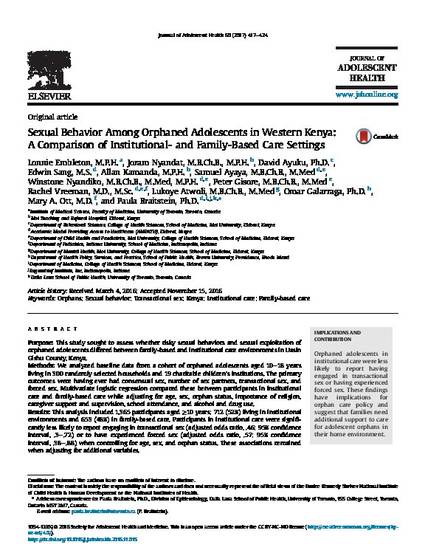
Purpose: This study sought to assess whether risky sexual behaviors and sexual exploitation of orphaned adolescents differed between family-based and institutional care environments in Uasin Gishu County, Kenya.
Methods: We analyzed baseline data from a cohort of orphaned adolescents aged 10–18 years living in 300 randomly selected households and 19 charitable children's institutions. The primary outcomes were having ever had consensual sex, number of sex partners, transactional sex, and forced sex. Multivariate logistic regression compared these between participants in institutional care and family-based care while adjusting for age, sex, orphan status, importance of religion, caregiver support and supervision, school attendance, and alcohol and drug use.
Results: This analysis included 1,365 participants aged ≥10 years: 712 (52%) living in institutional environments and 653 (48%) in family-based care. Participants in institutional care were significantly less likely to report engaging in transactional sex (adjusted odds ratio, .46; 95% confidence interval, .3–.72) or to have experienced forced sex (adjusted odds ratio, .57; 95% confidence interval, .38–.88) when controlling for age, sex, and orphan status. These associations remained when adjusting for additional variables.
Conclusions: Orphaned adolescents living in family-based care in Uasin Gishu, Kenya, may be at increased risk of transactional sex and sexual violence compared to those in institutional care. Institutional care may reduce vulnerabilities through the provision of basic material needs and adequate standards of living that influence adolescents' sexual risk-taking behaviors. The use of single items to assess outcomes and nonexplicit definition of sex suggest the findings should be interpreted with caution.
Available at: http://works.bepress.com/lukoye_atwoli/41/

This work was published before the author joined Aga Khan University